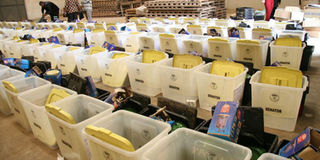Forget referendum or elections; we can use Charity Sweepstakes instead

IEBC ballot boxes in Makueni on July 24, 2013. FILE PHOTO | JENNIFER MUIRURI |
What you need to know:
- Wise move: Instead of wasting precious time and resources on debates, let us cast lots.
- Anything is better, surely, than the current charade.
Kenyan elections and referendums should be banned. They are the biggest waste of time and money in the world.
Our voting patterns are determined, not so much by the famous “tyranny of numbers”, but more by a “tyranny of cousins” — a condition in which blood is “thicker than reason” and in which one must never deviate from the path of the tribe.
Everybody in Kandara today firmly opposes the proposed referendum, while those in the Cord stronghold of Kasipul Kabondo support it to the hilt.
(READ: The referendum fever)
Sample these results from the 2010 katiba referendum. William Ruto rejected the draft and used the ‘No’ campaign to entrench his position at the high table of Kenyan politics.
His Kalenjin constituency did not let him down. They, like their leader, decided they did not support the Constitution.
In Mosop, the results were 95 per cent No, 5 per cent Yes, Belgut (93 per cent – 7 per cent) and Konoin (94 per cent to 6 per cent).
Prime Minister Raila Odinga declared that he favoured the draft charter, and Luo voters shared his enthusiasm.
The results were 99 per cent Yes in Rangwe, 1 per cent No, Ugenya (99 per cent – 1 per cent), Uriri (99 per cent – 1 per cent) and so it went on.
The story was repeated in President Kibaki’s backyard where the final score among the Kikuyu was 93 per cent Yes in Mathioya, 7 per cent No, Othaya (92 per cent – 8 per cent) and Tetu (93 per cent – 7 per cent).
GET CREATIVE
These elaborate debates we are holding are, therefore, a waste of time.
Almost every position a Kenyan adopts today is dictated by the whims of the politicians from the Big Five ethnic communities.
We march in lock-step with them and will jump as high as they demand.
Instead of wasting billions of shillings on elections and referendums, we should get a bit more creative.
It is not unheard of in other parts of the world.
In Japan, I was astonished to learn that they decide who should get a promotion based on their blood group.
Some fellows came up with the claim that one’s behaviour is determined by what blood group they are born into: Type As are sensitive perfectionists and good team players but over-anxious. Type Os are curious and generous but stubborn. ABs are arty but mysterious and unpredictable, and type Bs are cheerful but eccentric and selfish.
So in an interview room don’t be surprised to be asked: “What’s your blood group?”
In ancient Greece, they picked their leaders by “drawing straws” where cylindrical objects which all appeared the same size would be put in one place and the electorate (only males qualified) would pick a straw each. One straw would be shorter than the rest and the man who picked it would be the leader.
This method, known as sortition, is still used in England when candidates end up in a tie.
Plato and Aristotle praised this random method of choosing leaders as the height of democracy because it regarded all men as equal.
BLINDFOLDED GIRL
Instead of debating endlessly about referendums and arguing bitterly about election results — with our positions on these issues being strictly determined by where we come from — we should abandon the whole circus and seek home-grown innovations.
We could ask the candidates to hold a debate moderated by Linus Kaikai at the Bomas of Kenya. At the end of it, a blindfolded girl would walk in and place a hand on the lucky person who would immediately be declared president and sworn in the next day.
Or we could collect the names of various candidates (or referendum questions) and scatter them on the turf at Nyayo stadium and then ask Julius Yego to hurl his javelin in the general direction of the names.
Whichever one would be nearest to the point of contact of the javelin would carry the day. You can call it Charity Sweepstakes democracy.
Anything is better, surely, than the current charade that will end, as sure as night follows day, with 99 per cent of the supporters of Uhuru Kenyatta backing their leader’s horse and those of Raila Odinga siding with their man with equal force.





